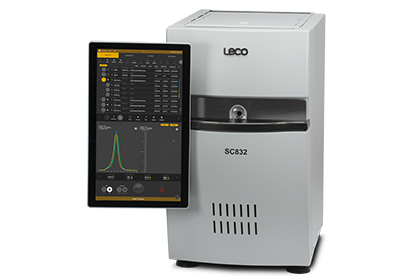LECO Solutions for Energy and Fuels
LECO’s cutting-edge analytical instruments are at the forefront of innovation in the Energy and Fuels Industry, providing unparalleled precision, reliability, and efficiency. Our advanced solutions empower energy producers, refineries, and researchers to optimize processes, ensure product quality, and drive the development of next-generation fuels.
Key Advantages of LECO’s Instruments:
- Unmatched Accuracy: Industry-leading precision for confident decision-making and regulatory compliance
- Versatility: Adaptable to a wide range of sample types and analytical needs across the energy sector
- High-Throughput Capabilities: Rapid analysis times to keep pace with demanding production environments
- Robust Engineering: Designed to withstand the rigors of energy and fuel production facilities
- Intuitive Software: User-friendly interfaces with powerful data analysis and reporting tools
- Automation Options: Streamline workflows and minimize manual intervention for increased efficiency
- Global Support Network: Access to LECO’s team of energy and fuels specialists for ongoing support and training
Partnering with LECO means more than just acquiring analytical instruments – it’s about gaining a competitive edge in the dynamic Energy and Fuels Industry. Our solutions enable you to:
- Optimize production processes for improved efficiency and reduced costs
- Ensure consistent product quality to meet or exceed industry standards
- Stay ahead of evolving regulatory requirements with confidence
- Drive innovation in alternative and renewable energy sources
- Make data-driven decisions to maximize resource utilization and minimize environmental impact
Choose LECO to power your analytical capabilities and energize your success in the ever-evolving landscape of energy and fuels.
Comprehensive two-dimensional gas chromatography with flame ionization detection (GCxGC-FID) has proven to be one of the most effective analytical methods for analyzing complex mixtures, allowing for the detailed separation and identification of the hydrocarbons present while providing efficient, high-resolution chromatographic separations.
Designed for Energy and Fuels

828 Series
LECO 828 Series: Macro Combustion Analysis for Carbon, Hydrogen, Nitrogen, and Protein Determination
Explore 828 Series







TGA801
Thermogravimetric Analysis of Moisture, Ash, Volatile Content, and Loss-on-Ignition
Explore TGA801

Application Notes
Learn more with our latest Energy and Fuels application notes.
-
Quantitation of Olefin Content in Plastic-Derived Pyrolysis Oils – QuadJet SD
Comprehensive two-dimensional gas chromatography with flame ionization detection (GCxGC-FID) has proven to be one of the most effective analytical methods for analyzing complex mixtures, allowing for the detailed separation and identification of the hydrocarbons present while providing efficient, high-resolution chromatographic separations.
-
Satisfying ASTM D8396 Requirements Paradigm GCxGC-FID
This application note describes how to use a simple workflow with the LECO Paradigm system to fulfill the requirements of the ASTM D8396 test method to quantitatively determine mass % of total n-paraffins, iso-paraffins, naphthenes, 1-ring aromatics, and 2-ring aromatics using reverse-fill flush flow modulated comprehensive two-dimensional gas chromatography–flame ionization detection (GCxGC-FID). Understanding of bulk composition is crucial for fast-track certification of synthetic aviation fuels as outlined in ASTM D4054, and the more accurate group-type analysis results provided by GCxGC assist with streamlining the acceptance process.
-
Determination of Ash in Polystyrene
Determination of Ash in Polystyrene
- Determination of Ash in Polyethylene
- Determination of Ash in Polypropylene
Videos
Watch our most recent videos on Energy and Fuels.
-
Non-Targeted Screening in Sustainable Fuels: Exploring Method Development and Fuel Quality Assessment Using GCxGC-MS and Hyphenated Techniques
Joining us from University of Southampton, Prof. John Langley, Head of Characterisation and Analytics, Chemistry, present on the latest advancements in renewable and sustainable fuel analysis. Prof. Langley explores how these next-generation fuels introduce new hurdles for quality measurement, requiring innovative hyphenated techniques, including GC-MS and comprehensive two-dimensional gas chromatography (GCxGC-MS). He discusses how GCxGC-MS is pivotal for comparing and analyzing different HVOs, providing clarity on how these tools enable the screening of differences and similarities across various renewable fuel sources.
Part of the 2024 Non-Target Screen Webinar Series -
Analyzing Light Crude Oil and High Boilers with GCxGC
Thomas Groger [University of Rostock] discusses the benefits that GCxGC provided their laboratory with the study of crude oils, bitumen, and various high boilers (solvents added to slow evaporation rates).
-
Battling Fuel Fraud to Achieve ASTM D5769
Christina Kelly [LECO] explores how gas chromatography techniques can be utilized to identify fuel fraud - tax evasive behaviors utilizing gasoline-based fuels - and how LECO instruments perform against ASTM D5769 (standard test method for determination of benzene, toluene, and total aromatics in finished gasolines).
